Terme Bjelovar Wants Indoor, Outdoor Pools, Recreation and Water Park
January the 30th, 2021 - Local residents and other visitors to continental Croatia are always in need of some very welcome refreshment and cooling off during the hot summer months. Could Terme Bjelovar be a project that proves worthy?
As Poslovni Dnevnik/Darko Bicak writes, local elections are due to be held in Croatia in just a few months, and many projects across numerous Croatian cities and municipalities will be announced in the coming period. Whether Terme Bjelovar will be one of the successful ones could be found out soon.
Namely, as was confirmed over recent days by Bjelovar Mayor Dario Hrebak, the construction of Bjelovar spas in the Veliko Korenovo zone is getting closer and closer to realisation.
He explained that the Terme Bjelovar project is worth a quarter of a billion kuna including VAT, which includes all of the costs so far - the purchase of the land, the construction of a geothermal well, equipment, projects, and consulting.
The hopes and plans are, they have pointed out from Bjelovar, indoor and outdoor pools, ie Olympic sized ones, recreational pools and even a water park. Everything relies on a geothermal spring with a constant water flow of 10 l / s and a temperature of 30 ° C.
They expect that the development of Terme Bjelovar's ''thermal riviera'' will be the induction of new facilities that will encourage the development of other tourist infrastructure and the development of tourism in that otherwise often overlooked area of the country.
Hrebak explained that they decided on a "somewhat megalomaniac" project and an Olympic indoor pool after talks with national sports associations in Zagreb, where it was concluded that this is a unique opportunity to raise sport in Bjelovar to a much higher level.
"I held a meeting with the leaders of the swimming and water polo federations where it was concluded that it would be a real shame not to take the opportunity now and just skip the construction of the Olympic pool. Given that in 2021 the National Programme of Recovery following the coronavirus crisis will be created, within which all counties, cities and municipalities in Croatia will be included in the catalog with all projects in a high stage of readiness, I think we can get additional financial funds,'' said Mayor Hrebak.
Bjelovar had an indoor swimming pool until 2019 within the Retirement Home, but it was closed due to excessive maintenance costs. The outdoor swimming pool, on the other hand, was renovated in 2018 and has been attracting thousands of guests every summer since.
For the latest travel info, bookmark our main travel info article, which is updated daily.
Read the Croatian Travel Update in your language - now available in 24 languages.
Croatian Caterers Announce Lawsuits and Disobedience in Face of Measures
January the 30th, 2021 - Croatian caterers and others in the hospitality sector have been met with the extension of their work ban and many are now claiming that enough is enough.
As Poslovni Dnevnik/Marija Crnjak writes, the government's decision to extend the lockdown for Croatian caterers, others in the hospitality sector and gyms in the new set of epidemiological measures has met with harsh criticism on the ground, and announcements of civil disobedience, ie opening up facilities despite the continuation of the work ban, have already started.
Although they understand that decisions are made to protect public healh, Croatian caterers don't understand why everyone can sell coffee to go and coffee outside except cafes. As such, they feel discriminated against and have warned that they can no longer afford to go on in this way financially, especially not without additional subsidies.
The Croatian Employers' Association says that it will ask the government to extend the existing measures to support Croatian caterers and other business entities to alleviate the pressure caused by the coronavirus crisis even after February, and to do so for as long as the economic consequences of the crisis caused by the coronavirus pandemic remain present. They have also asked that this be so even for those who haven't had their work banned or limited.
As it is now known, the government recently made a decision to relax measures which restrict sport and other such activities, but this goes only for outdoor activities, and a return to school for all primary school children is also happening. For the economy, the situation remains more or less the same until mid-February, when the measures will be revised again.
''We're seeking an urgent meeting!’'
"The National Civil Protection Headquarters made this decision because they believe that it isn't epidemiologically correct to open cafes, because it encourages people gathering together. Furthermore, it was concluded that due to the fact that we failed to create a collective awareness of compliance with the measures, Croatian caterers can't work because their job also involves personal happiness and individual satisfaction, not just selling items.
We believe that the Headquarters doesn't actually have a real picture of the situation on the ground and we've requested an urgent meeting in this regard. We believe that this decision is not particularly wise, but everyone chooses their own path when it comes to fighting the pandemic.
We do respect these decisions, but for as long as we don't have adequately implemented financial assistance, we can't be expected to stop fighting for a fair balance between compliance with epidemiological measures and the financial damage it brings,'' stated the National Association of Caterers.
However, as the new president of the association, Jelena Tabak, revealed, the association doesn't plan to organise or actively encourage any activities which could be classed as civil disobedience, ie opening facilities without the green light from both the Headquarters and the government.
"We aren't for that, but we won't be able to control the situation on the ground if it starts to happen. We've told those who are our members that whoever opens their doors must be held individually responsible for such a decision,'' warned Tabak.
The association is expecting an invitation from the Headquarters and the government, and on the table will be the Croatian caterers' request to be paid a fee of 3 percent of their annual turnover in order to survive until they can open their doors again. This is a total amount of 450 million kuna of support that they asked for a week ago, but so far they haven't received a rejection or support from the Government on this topic.
“We also don't yet have any court decision that the write-off of fixed costs will continue for January and February, and we ask to no have to pay in advance for the services for which we should receive a write-off. We're seeking an urgent meeting with the Headquarters, to whom we want to explain why the Croatian caterers aren't encouraging the spread of the infection,'' said Jelena Tabak. Croatian caterers are ready to wait for answers to these questions, but only until the middle of next week.
Others have announced a form of 'revenge'...
The Voice of Entrepreneurs Association (UGP) is much more direct in their views, their president, Hrvoje Bujas, has announced that they will still consult, but various options for finally taking action are being considered, from lawsuits to civil disobedience. Some Croatian caterers have announced the opening of their respective facilities on February the 1st, and have even called for lawsuits against the state.
Their position is that mass opening would not be possible to prevent or sanction, and so they're calling for just that.
For the latest travel info, bookmark our main travel info article, which is updated daily.
Read the Croatian Travel Update in your language - now available in 24 languages.
List of All Measures in Croatia Valid Until February 15, 2021
January 29, 2021 – According to the National Civil Protection Headquarters' decision, a minimal easing of measures will take effect from tomorrow. A list of all measures in Croatia valid until February 15, 2021.
With the presentation of the minimum concessions of measures, which include the return of all primary school students to schools and outdoor sports, the National Civil Protection Headquarters today announced four new decisions. Three decisions concern the extension of existing measures for public transport, for shopping malls, and for borders. The fourth decision contains all the measures that remain in force, as well as the changes that have been introduced in the field of sports.
Here are all the measures that are in force from midnight until February 15, 2021:
- a ban of all public events and gatherings attended by more than 25 people in one place;
- a maximum of 10 people from a maximum of 2 different households can be present at private gatherings and ceremonies;
- public events, gatherings, and ceremonies of all kinds can last until 10 pm;
- a maximum of 25 people may be present at funerals, final farewells, and urn layings; condolences to the bereaved must not be expressed through close contact, and cemetery administrations are obliged to monitor compliance with anti-epidemic measures;
- limitation of working hours for bakeries and shops for bread and bakery products until 10 pm;
- a ban on the sale of alcoholic beverages between 10 pm and 6 am;
- suspension of catering facilities and provision of catering services on family farms, except for catering facilities from the groups "Hotels", "Camps" and types Student Dorms or Akademis from the group "Other catering facilities for accommodation", which may only serve guests who use the accommodation service in them, i.e. pupils or students.
- As an exception to this anti-epidemic measure, catering facilities from the group "Restaurants", the group "Catering facilities" and types of coffee rooms, pubs, buffets, inns, taverns, and cellars from the group "Bars" are allowed to prepare and deliver food and beverages. These catering facilities may prepare or deliver food in compliance with all anti-epidemic measures in one of the following ways: by personal takeover before entering the catering facility without entering it, by delivering food from the catering facility by own delivery vehicle, by delivering food from the catering facility based on the contract business cooperation concluded between caterers and third parties (legal or physical-craftsmen), who are registered and entered in the Register of entities in the food business, the so-called "drive-in" way.
- suspension of wedding ceremonies;
- suspension of casinos, slot machine clubs, and betting points;
- suspension of gyms, fitness centers, and sports and recreation centers indoors;
- suspension of children's and other workshops and organized dance schools;
- suspension of all amateur cultural and artistic performances, programs, and events, and rehearsals of amateur ensembles, groups and choirs, including church choirs;
- ban on the food and beverages consumed during cinema screenings;
- suspension of fairs and other forms of economic and tourist events or events where products are sold, exhibited, or displayed;
- prohibition of all indoor training except for: clubs competing in the 1st and 2nd rank of competition in senior competition and in the 1st rank of competition in junior competition at the national level in team sports, clubs that compete in individual sports in senior competition in team club competitions at the national level in the highest rank in the league competition system, and training and competitions of categorized athletes in individual sports and athletes of national level who are preparing for European and world competitions in accordance with the list which, at the proposal of the Croatian Olympic Committee, the Croatian Paralympic Committee, and the Croatian Sports Association of the Deaf, is approved by the Ministry of Tourism and Sports (Does not apply to water sports and contactless individual sports in sports balloons);
- permitted sports competitions and trainings can be held only without spectators and with strict adherence to all prescribed epidemiological measures, the organizers are obliged to ensure that all athletes and necessary technical staff adhere to the prescribed epidemiological measures, and that sports facilities are used exclusively for permitted activities;
- foreign language schools can only operate online or otherwise to maintain remote contact;
- driving schools can hold only online classes or otherwise to maintain long-distance contacts, driving lessons can last a maximum of 45 minutes with mandatory measurement of body temperature before entering the car, a break between two candidates must be a minimum of 10 minutes to ventilate and disinfect the car, and records must be kept of all participants in driving lessons;
- mandatory use of face masks or medical masks outdoors when it is not possible to maintain a physical distance of at least 1.5 meters;
- the obligation of tenants, building managers, employers, and representatives of public institutions to regularly disinfect all common areas (handrails, elevators, work surfaces, toilets, etc.);
- a recommendation that religious rites be broadcast whenever possible through radio, TV, or other means that will allow believers to attend a religious rite without coming to religious facilities.
Anti-epidemic measures do not apply to:
- professional artistic performances and programs that do not include choral singing;
- cinema screenings;
- exhibitions in museum, galleries, and other exhibition spaces;
- coronsessions of representative bodies.
- For all events and gatherings, the number of people present is limited due to the size of the space. At least 7 m2 of net area must be provided for each person present, in strict compliance with all prescribed epidemiological measures of the Croatian Institute of Public Health. Also, at the entrance to the facility, a notice must be clearly displayed about the largest possible number of people who can be present in the facility at the same time.
The organizers of the gatherings are obliged to ensure regular ventilation of the premises, that no more people than the allowed number are present, and that everyone adhere to all prescribed epidemiological measures of the Croatian Institute of Public Health.
Source: Index.hr
Conflict of Interest Commission Launches Proceedings Against Brnjac
ZAGREB, 29 January, 2021 - The Conflict of Interest Commission on Friday launched proceedings against Tourism and Sport Minister Nikolina Brnjac for her failure to declare a speed boat her husband owns in her Declaration of Assets in a timely fashion.
The complaint notes that Brnjac and her husband obtained a valuable asset without a loan and failed to declare the Jeanneau Leader 805 speed boat registered in her husband's name on her Declaration of Assets.
The applicant of the complaint claimed that Brnjac's husband only declared a small vessel while failing to declare the new vessel purchased in 2018 that is valued at €85,000.
In an explanation to the commission Minister Brnjac presented a sales contract noting that she had omitted to note that the proceeds from selling the smaller vessel went to purchase the new boat.
The commission confirmed that in 2019 Brnjac reported the new vessel in her Declaration of Assets, which meant her declaration had not been adjusted to the real state of affairs for a year and a half.
Brnjac added that she did not intentionally fail to declare the vessel as she did not consider it necessary to declare the new vessel as its value was the same as the vessel sold.
Plenković on Quorum Being Broken: We Won't Forget This
ZAGREB, 29 January, 2021 - PM Andrej Plenković said on Friday that his HDZ party will not forget that the opposition broke the quorum in parliament due to postponement of a vote on abolishing the mandatory membership fee for the Croatian Chamber of Commerce at a time when HDZ MP Miroslav Tudjman was in hospital due to COVID-19.
"One of our MPs is in hospital because of COVID-19 and they did exactly what I thought they would. This is not about the quorum but about the fact that Mr Tudjman is unable to attend. That is a very important message. The Opposition broke the quorum knowing that one HDZ MP, the oldest in this parliament, is practically fighting for his life," Plenković told reporters after officially putting into operation the LNG terminal and the Zlobin-Omišalj interconnection.
Opposition making a show because of HRK 42 a month
We won't forget this for a long time nor should the public, he added.
As far as the membership fee for the Croatian Chamber of Commerce (HGK) is concerned, he assessed that the public has witnessed numerous populist initiatives filled with demagogy, underlining that the membership fee for all businesses with lower revenue is HRK 42 a month.
"The HRK 42 is obviously the reason for this initiative. No one is saying that the HGK could not function better, be more useful and more accessible but it has existed for 160 years or more. That is not an organisation that can be dismantled over an opposition whim or some demagogical or populist intentions," said Plenković.
"If something needs to be changed, we can discuss what can be changed but to make a political show for the sake of HRK 42 a month is something only this opposition can do," Plenković underscored.
By walking out of the parliament today the opposition prevented a vote on the amended law on post-earthquake reconstruction, the declaration of the Exclusive Economic Zone in the Adriatic and the National Development Strategy, he said, stressing again that he would not forget it.
I understand it is hard but we are assisting those who cannot work
Referring to plans by cafe and restaurant owners to stage protests because COVID-19 restrictions will not be eased, Plenković recalled that winter is a time when COVID-19 spreads more easily and that most countries are introducing even harsher restrictions than Croatia.
In many countries non-essential stores are closed. There is a ban on the work of hairdressers and many other services that are operating in Croatia, Plenković said, adding that relaxing restrictions for schools and sports was a message of support for citizens' good behaviour.
"I understand that it is difficult for anyone who is shut but I will say that the state has stood by people who cannot work and that we will give a total of HRK 2.5 billion for those who cannot conduct their commercial activities," said Plenković, appealing to everyone to have understanding for the current circumstances - the new virus strains, a slowed-down vaccination process and the winter months.
He said that neither the EU nor Croatia had considered obtaining the Russian or Chinese vaccine in light of the fact that sufficient doses had been ordered.
"If the current problems escalate, we can put those options on the table as well," he added.
Commenting on Žarko Tušek's resignation as head of the HDZ branch in Krapina-Zagorje County, Plenković said Tušek had made a serious political mistake and was suffering the consequences.
UNICEF Providing Psychosocial Support in Earthquake-Hit Area
ZAGREB, 29 January, 2021 - Mobile teams of selected experts in psychosocial support for children and families in the areas of Glina, Petrinja and Sisak, hit by a devastating earthquake on 29 December, have started working, their priority being foster families.
The project was initiated by the Labour, Pension System, Family Affairs and Social Policy Ministry and the Society for Psychological Assistance with support from UNICEF, UNICEF said on Friday.
Mobile teams will give priority to foster families, notably those whose homes have been damaged, and at-risk families included in social welfare programmes.
There are 49 foster families in Sisak-Moslavina County and 32 of them live in the areas hit by the earthquake.
Those families care for 125 foster children, and 82 live in Sisak, Petrinja and Glina.
Marina Ajduković of the Society for Psychological Assistance said that in situations such as natural disasters it was important to provide psychosocial support to children and young people and their families so as to reduce their anxiety, fear and mental suffering.
Around 50% of children exhibit various anxiety-related symptoms even six months after a traumatic event and even though most children gradually recover after an earthquake, 25-30% of them exhibit chronic or prolonged symptoms of depression and/or anxiety, she warned.
In cooperation with its partners on the ground, UNICEF will organise space and places for play and psychosocial support for children temporarily accommodated in container settlements and shelters.
Number of Deaths 13% Higher Due to COVID
ZAGREB, 29 January, 2021 - Croatia registered 13.2% more deaths in March-December 2020, during the COVID-19 pandemic, than at the same time in 2019, the national statistical office said on Friday, adding that year on year the number of deaths in December alone jumped by 77.3%.
In 2020, 8.3% more deaths (+4,350) were registered than in 2019. From March through December, the number of deaths was up by 13.2% (+5,523).
The largest number of deaths in Croatia in a month was registered last December, a total of 7,395, which was up by 77.3% from December 2019 (+3,225).
The second largest number of deaths in a month was registered in January 2017, a total of 6,512, while the third was in January 2019 (5,504).
January and March have been the other months with the most deaths but they have not exceeded 5,500.
International Study in Croatia: Rijeka's Biotech for Life Sciences Programme
January 29, 2021 - Options for international study in Croatia are on the rise - meet the English-language 'Biotechnology for the Life Sciences' Masters programme at Rijeka University, as presented by resident lecturer, Nick Bradshaw.
When students say that they are going abroad to study, you would normally expect them to be aiming for universities in the USA or Northern Europe. A few months ago, however, and in spite of the pandemic, a small group of students from the UK, Italy and Nigeria made the decision to travel to Croatia and begin their master’s study at the University of Rijeka. They represent the first generation of students to enrol in the Department of Biotechnology’s new international graduate study program, “Biotechnology for the Life Sciences” (Biotech4LS).
Biotechnology is a general term for the use of biology and living things to create products, whether for medicine or more everyday life. The rapid generation of vaccinations against the new coronavirus is a great example of modern biotechnology in action. The Biotech4LS course is particularly interested in how we can use biotechnology techniques for life sciences (biology or medical) research. This focus on research (as well as the fact that it is taught in English) is what makes Biotech4LS a modern program that appeals to international students.
Research experiments, whether done traditionally in a laboratory or simulated on a computer, lie at the heart of modern science, and the abilities required to be a successful researcher can be very different from those required to complete a traditional knowledge-based university degree. Biotech4LS therefore specifically aims at developing the skills students need to pursue a future career in research, whether at a University or in industry, and is one of only a handful of courses in the entire European Union to take this approach. As a result, this course will not only be training a new generation of dynamic young scientists, but also highlighting both Rijeka and Croatia more generally as an emerging centre for scientific research when (and if!) they decide to return to their home countries.
To do this, most of the traditional teaching of scientific facts and knowledge found in traditional courses has cut out from Biotech4LS. The students are instead assumed to already be familiar with most of the basics, and are trained on how to find anything else they need to know through searching of the scientific literature. Instead, they spend the first year learning skills needed by modern scientists, including statistics, writing, project management and presentation skills, as well as being introduced to scientific ethics and handling of intellectual property. In conjunction with this, students spend two extended periods of time working in research laboratories, learning by doing alongside scientists engaged in cutting edge research.
It is possible that you are reading this and thinking that Rijeka might not seem an obvious place for cutting line research. The Department of Biotechnology, however, represents a major investment by the European Structure and Investment Funds, with whose support the Department gained a variety of state of the art equipment, including powerful microscopes, devices for analysing proteins, and even an on-site supercomputer. With this advanced equipment, staff at the Department have been making breakthroughs in a wide array of areas, ranging from the medical (mental and neurological illness, viruses and the immune system) to the commercial (biological and chemical analysis of food and wine). For the second year of their course, these students will find themselves integrated into one of these laboratories, undertaking their own personal research and making their own unique contribution to our scientific knowledge.
Each year, 10 students will be accepted for Biotech4LS, and the first round of applications received five times this many applicants, from more than 10 countries. While not all of the students selected managed to travel to Rijeka - a result of the unfortunate timing of launching in the middle of a global pandemic - several students have nonetheless made it. They have been settling into the program and life in Rijeka for three months now, and are now preparing to begin their laboratory work (as well as beginning to learn the Croatian language – nije lako!). They are excited that they will soon be able to soon begin their own independent research projects, and growing very fond of the quality of life in Rijeka.
A call for applications for the second generation of students (to begin October 2021) was made recently and runs until 28th February. It is open to both international and Croatian students.
More information on the program can be found in the course’s introductory video above, and on the course website, which also contains full application instructions. Establishment of Biotech4LS was supported by the European Social Funds project “Strategic Internationalisation of Graduate Studies in Mathematics and Biotechnology – OPTILIFE”.
And if you are wondering what Rijeka is like as a place to live, find out why some consider it to be the best place in Croatia. Where is the Best Place to Live in Croatia? The Case for Rijeka.
Split Office Rental of the Month: Could You Work with THAT View?
January 29, 2021 - Looking for a Split office rental to wow your clients? They don't come much better than this.
Location, location, location.
And the views don't come much better than this.
There is plenty of commercial space available for rent in Croatia, but few come with an address or view as this one. Located on the fabled Split riva with a quite spectacular view, I am not sure how staff will be able to get any work done, but if you are looking to impress clients, there are few better addresses than this one.
The property is offered for long teem rental by Trgostan, who introduce the property as follows:
Exclusive property for a long term rental - spacious apartment of 104 sqm turned into an office, in a prime location - directly on Riva - Split main promenade, in a building with elevator, with a fantastic sea view, very light, two balconies, which consists of the main spacious area, separated meeting area, additional room, kitchen, reception area and bathroom, which is due to its exceptional characteristics perfect for:
- embassies/consulates
- representations
- offices
Monthly rental price - 3,000 euro. For more photos, information, and to book a viewing, click here.
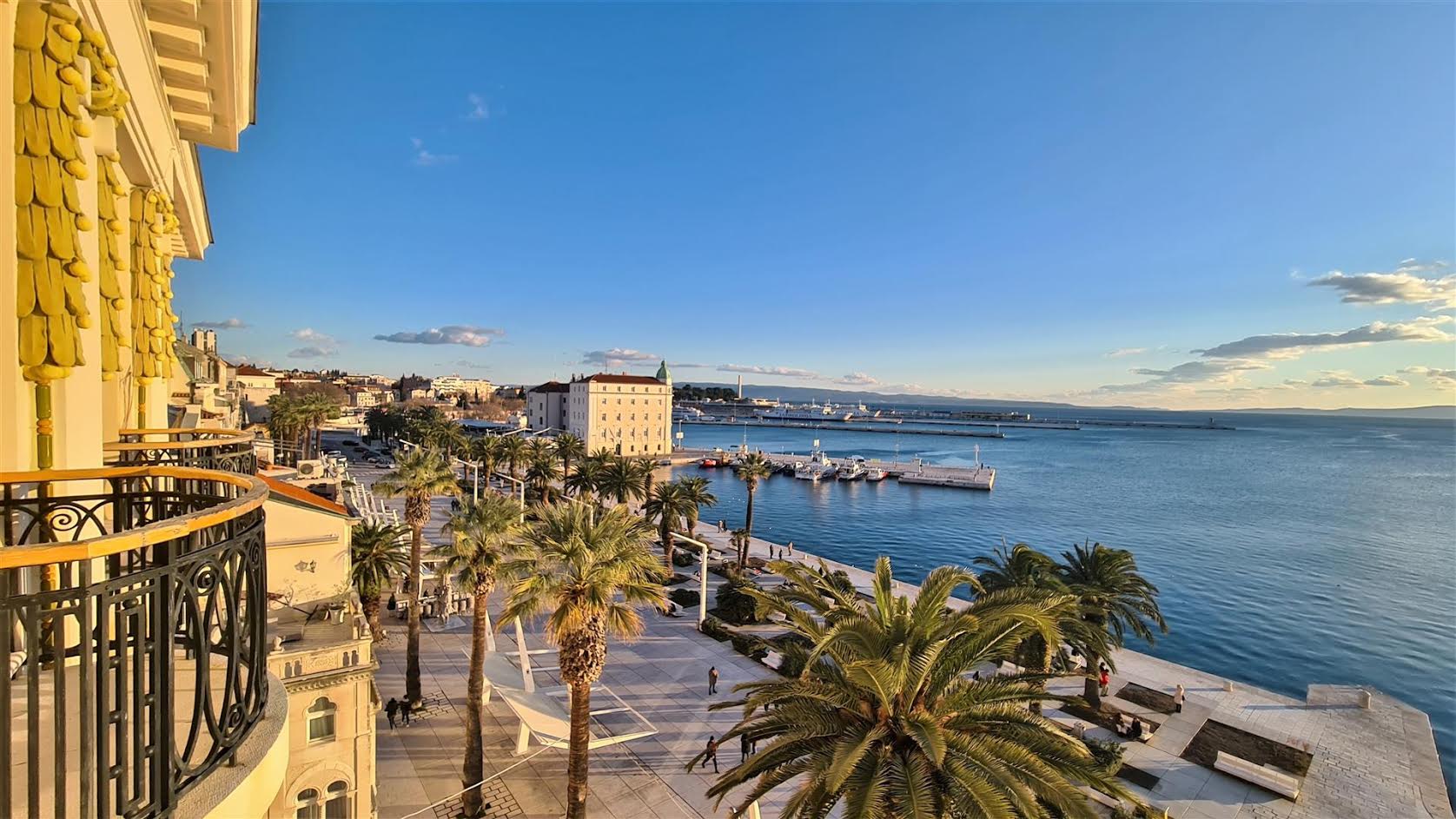
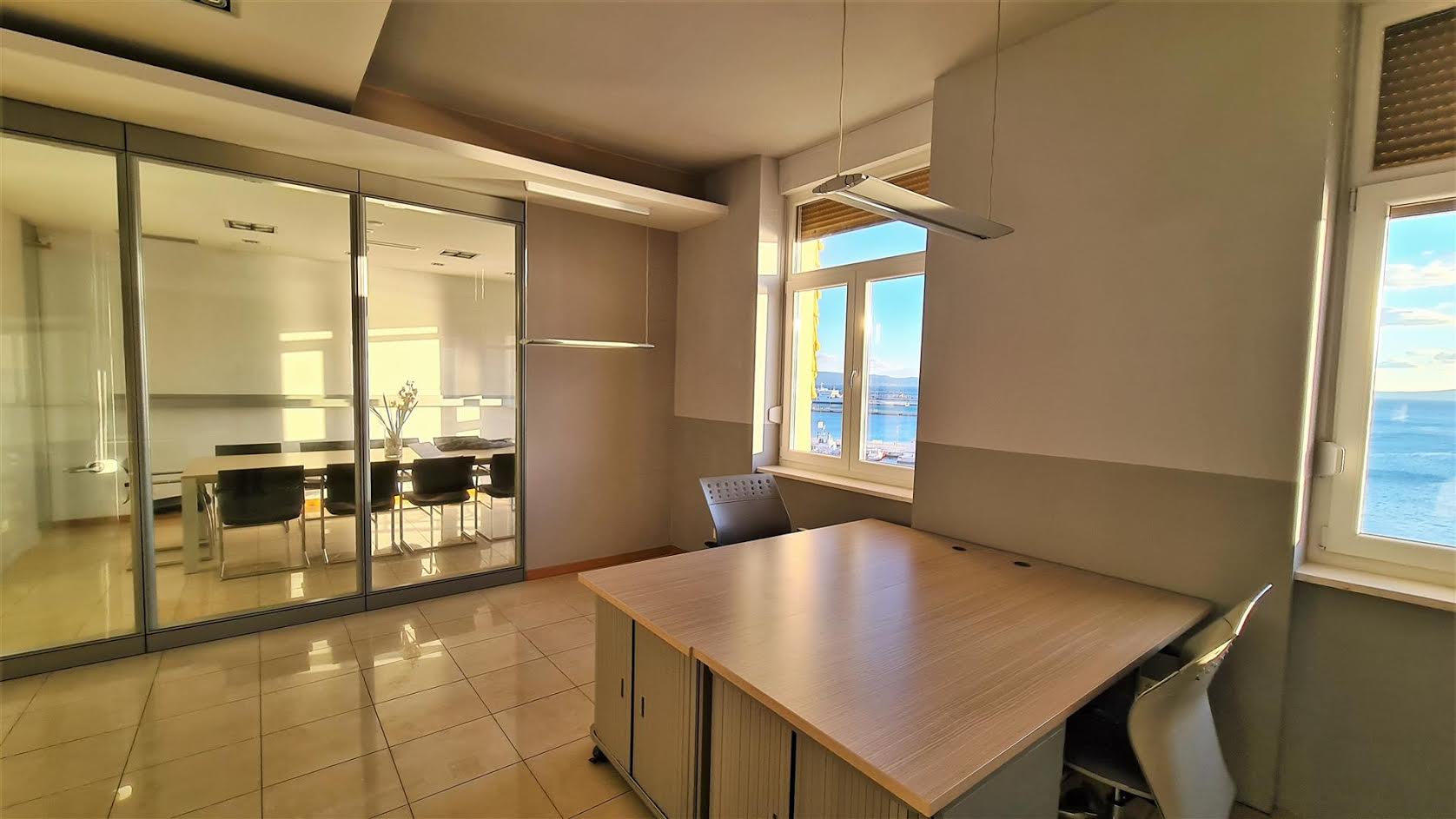
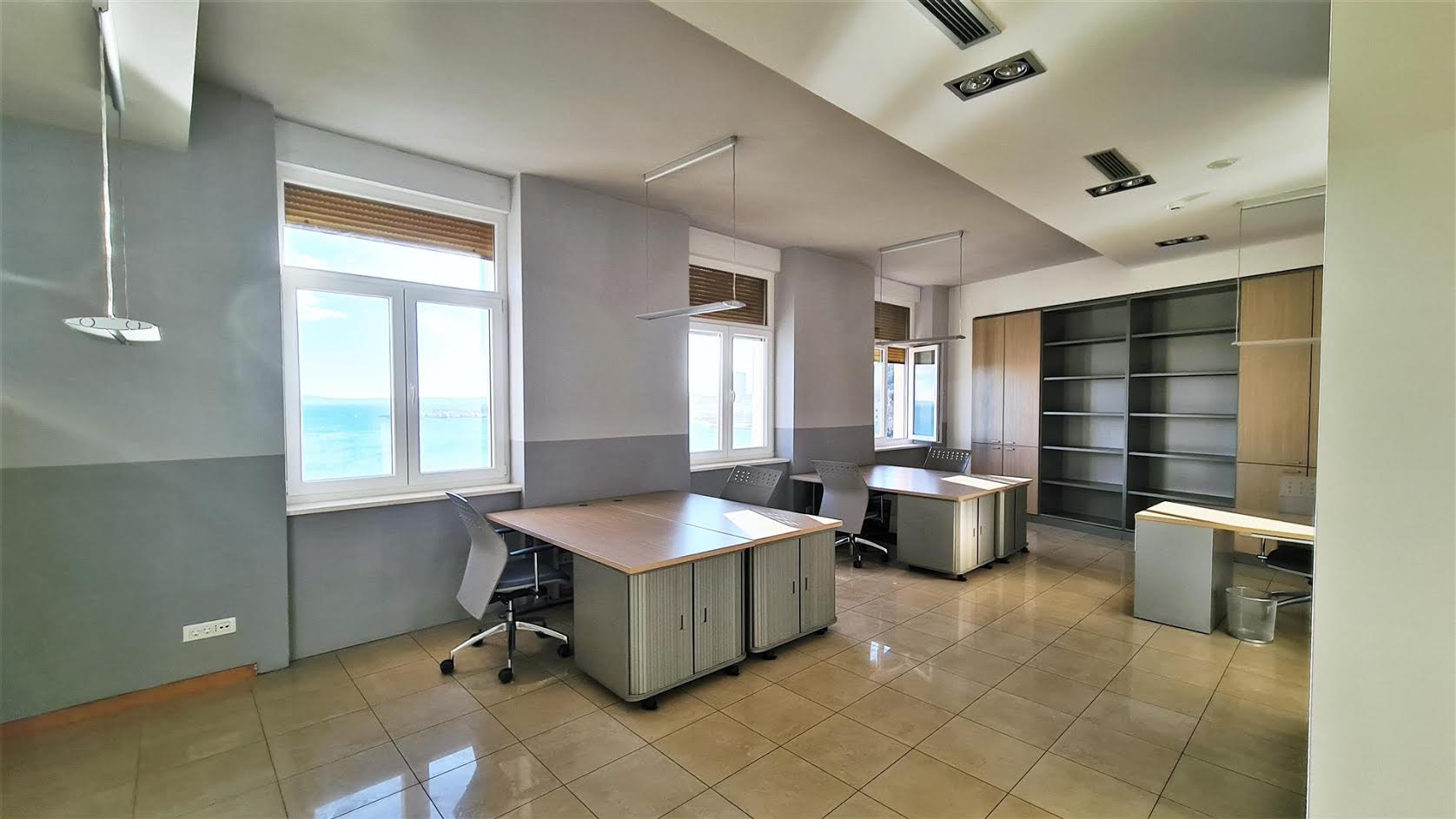
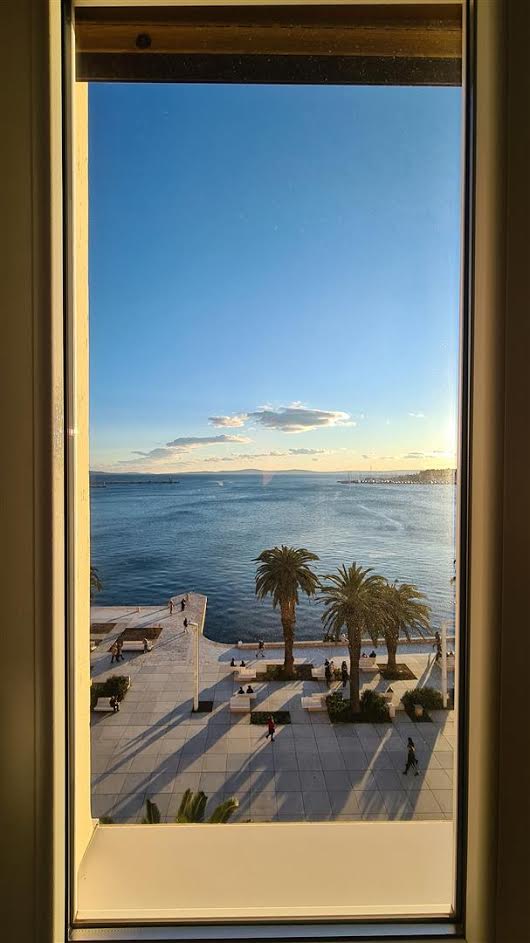
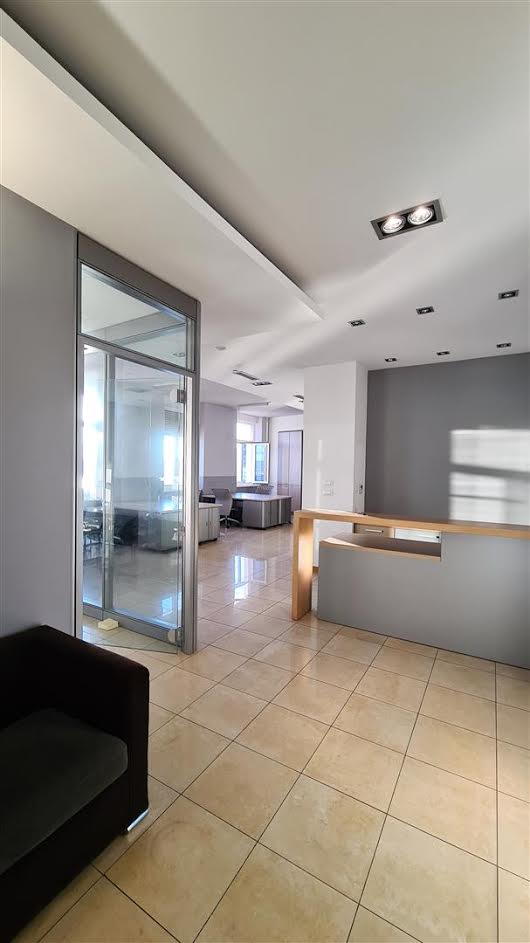
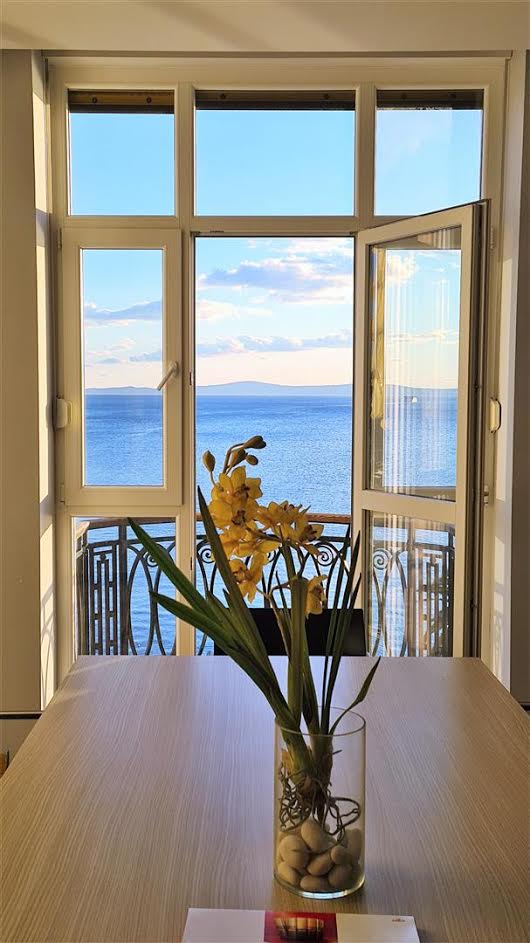
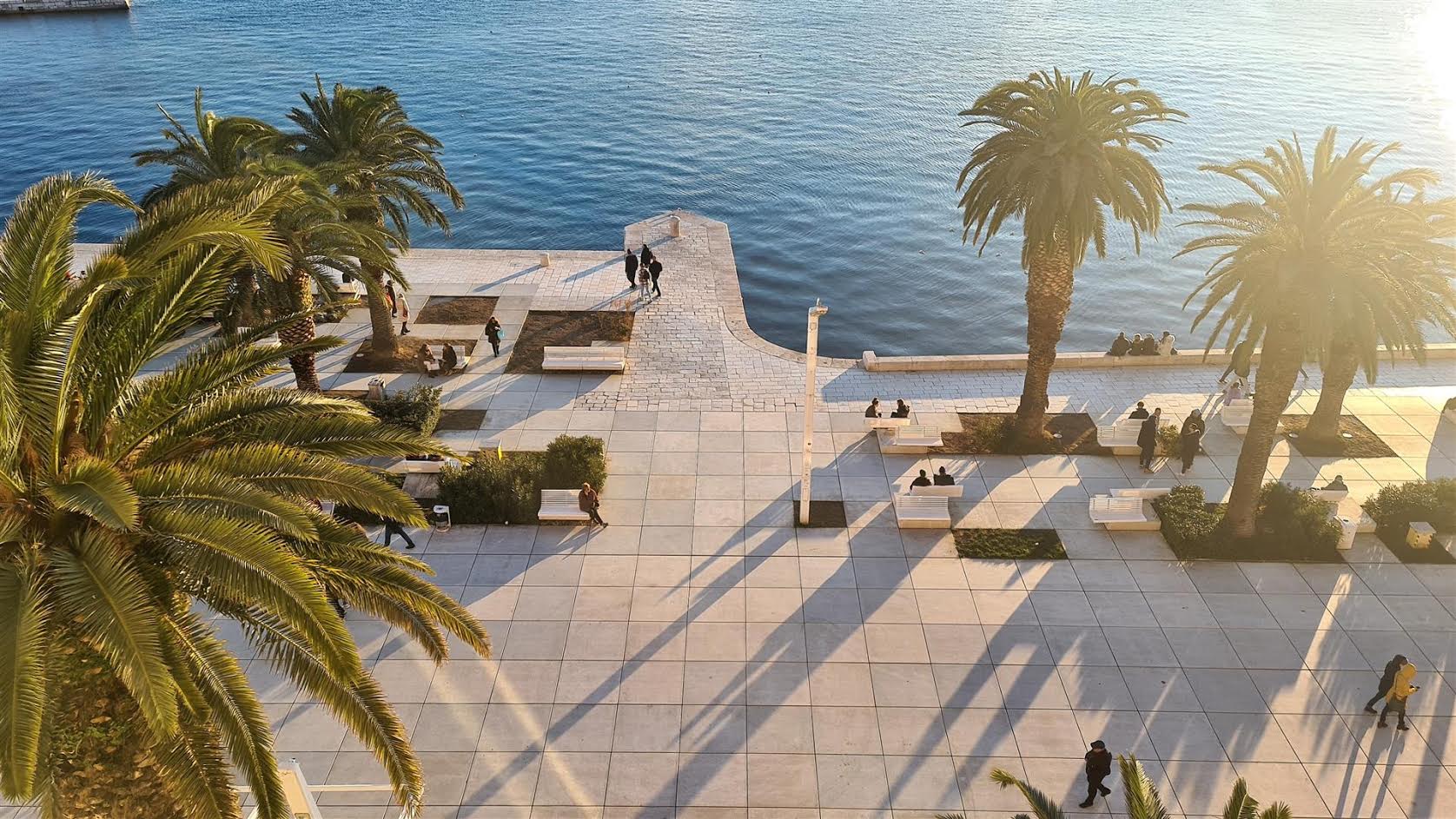
Ressler Elected EP Budget Rapporteur for 2022
ZAGREB, 29 January, 2021 - Croatian MEP Karlo Ressler (HDZ/EPP) has been appointed the European Parliament's rapporteur and negotiator on the EU budget for 2022, his office said on Friday.
Ressler is the youngest budget rapporteur in the history of the EP, assuming one of the most important roles ever held by a Croatian MEP, his office said.
He said the next two years would be crucial for economic and social recovery and that special emphasis would be put on those most affected by the COVID-19 crisis as well as on digital and green transformation, investment in quality jobs, science and research.
The budget must make sure that no generation, sector or region is left behind, he said, calling for investment in innovative sectors with high added value.


